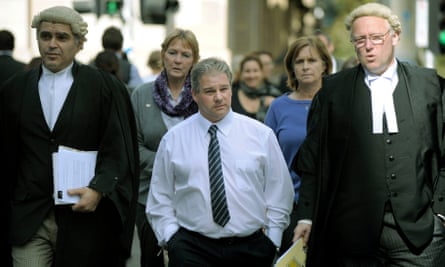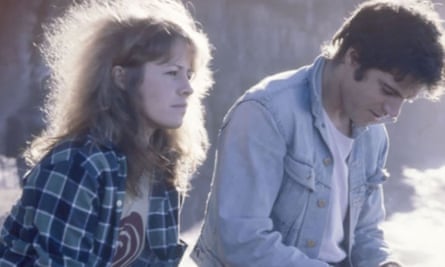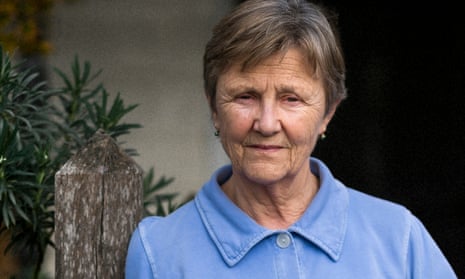Drive down a lonely stretch of Geelong road in Victoria and you’ll find Winchelsea, and three little white crosses. On Father’s Day 2005, Robert Farquharson, a window cleaner, was driving his three sons back to their mother’s house when his battered Commodore suddenly veered into a dam. The father swam free; the children all drowned. Farquharson would claim for the next seven years that he’d had a coughing fit. Was he a loving father, caught in a horrible accident? Or had he killed his kids, to get back at his ex-wife?
The Australian writer Helen Garner documented Farquharson’s trial and subsequent conviction in her 2014 book This House of Grief. It has become one of many true stories that are now known as “Helen Garner cases”: stories of bewildering violence and cruelty, or what she calls the “excruciating realms of human behaviour, where reason fights to gain a purchase”. Her novels are never entirely fiction, while her non-fiction is never only about crime, but dissections of her own thoughts, and ours as well.
Of the five non-fiction books, four novels, countless short stories and even more numerous pieces of journalism that make up Garner’s oeuvre, almost all touch on the darkness found in Australian suburbia: a single mother’s relationship with a heroin addict in Garner’s 1977 debut novel Monkey Grip; caring for a dying friend riddled with cancer in The Spare Room (which caused an unprecedented Man Booker brouhaha when her publishers complained that it was not considered for the prize); an academic accused of groping two female students in The First Stone; a young man killed by his girlfriend after a dinner party, at which several guests were warned what would happen – but did nothing – in Joe Cinque’s Consolation.
What is a Helen Garner case, to Helen Garner? “I’m interested in apparently ordinary people who suddenly snap and do things that are really terrible,” she says slowly, “but are just an exploded version of what ordinary people secretly fantasise about in moments of great rage or stress. I am interested in people whose self-restraint suddenly stops working.”

Why would a father kill his children? Why would someone kill their boyfriend? Would she? Would you? Her eye for telling observations is unmatched, and relentless; one friend recalls her pushing to the front of a funeral and whipping out her notebook to record the minutiae of a Jewish ceremony.
Garner, in person, seems smaller than her towering reputation might suggest, but she simmers with energy: over the years journalists have described her as “a grouchy literary lioness”. When we meet she seems more like a magpie (ruthless, intelligent, an appetite for shiny details) and not grouchy at all, although, at 75, her temper may have weathered with time.
Never just an observer in her stories, Garner is always in there, talking to grieving families, chasing gruff police officers, scrutinising showy barristers. Critics have accused her of inserting too much of herself into her books; in contrast, she sees it as a courtesy. “I think I am trying to take their story into me, give it my full psychological, human attention, from the depths of myself, as best I can, to give full value to the people in the story, to respect it and respect their dignity. And do it in the language of literature, a bloodstained language, one of violent emotion. There are ways to render these things without repulsive, sentimental language, the sort you read in trashy pulp.”
The French have a term for what Garner writes: récit, where the narration draws attention to itself. English-speaking critics, on the other hand, have been more preoccupied – and divided – by her blend of fact and fiction. “I think I do stump people,” she muses. “Maybe they just don’t like it, that’s OK. Australians seem to be particularly exercised by matters of genre. They just cannot stand it if it is not clear. They fear being taken for a ride.”
Just as her subjects are forced to admit their worst, Garner subjects herself to brutal scrutiny. When confronted with her mother’s Alzheimer’s, she writes in The Feel of Steel: “It’s all I can do not to smother her with a pillow, or tip her out of the wheelchair into the lake and hold her head under with my boot.”
Garner has ruthlessly exposed her own personal life. Born in Geelong, she was the eldest of six children in a white, working-class Lutheran family. Her father, whom she describes as “an endurance test that united his children in opposition to him”, clashed often with Garner; he confiscated her birth control, obsessed over her correspondence with men and fought with her three husbands. Her mother, “an anxious creature, timid and appeasing”, provoked mostly impatience. Her marriages are deemed “crashes” (she has happily remained divorced for almost two decades).

Her fiction came in one burst: the debut Monkey Grip, based on her diaries, was published in 1977; two novellas in the 1980s (Honour & Other People’s Children); The Children’s Bach was deemed by one critic in 1984 to be one of four perfect short novels in English (alongside The Good Soldier, The Great Gatsby and The Sun Also Rises); and Cosmo Cosmolino in 1992. But that same year, Garner was asked by Time to cover the murder trial of a man who had killed a toddler. She would not write a novel for another 16 years (and when The Spare Room was published in 2008, the main character was Helen, a writer in her 60s).
Her book on sexual harassment in a Melbourne university, The First Stone, had the impact of an avalanche in 1995. Infuriated by the decision of “cold-faced, punitive girls” to take groping claims against their college head to the police, Garner wrote to the accused man to lament the “appallingly destructive, priggish and pitiless way” he had been dealt with, a move that angered the students and their supporters. Throughout the book, Garner forgives the stupidity of fumbling blokes, in contrast to rapists (“If every bastard who’s ever laid a hand on us were dragged into court, the judicial system of the state would be clogged for years”), and warns against lumping all sexual crimes under one umbrella. “The ability to discriminate must be maintained,” she writes. “Otherwise, all we are doing is increasing the injustice of the world.”
Twenty years on, in light of Weinstein and #MeToo, the book has new resonance and she is still irritated by the reaction to it, mainly the accusations that she envied younger women. “I just think that is fucking pathetic,” she snaps. “I really do. I copped a hell of a blast over that book. It was horrible.” Does she still get letters? “Oh yes, but they’re nice now. Some of the responses at the time were poisonous.”
Whether we are now at the turning point women have been hoping for, she remains unsure. “Some days, I think this is just a million chickens coming home to roost, and I want to cheer. We are just so fed up of the constant pressure of men’s attention, it is just so boring. And other days I think: ‘Listen to them whingeing.’ Yes, some men need to be pushed off a cliff. Others are just twerps. There is a sense that there is no degree of offence. But no one wants to know about that now, it is all a crime.”
As to the question of whether we should avoid films involving the ever-growing list of Hollywood’s accused, “It’s an age old problem: you can be a great artist and a complete bastard at the same time. Does that mean we can’t look at Picasso any more? Do we allow his work to affect us, or the works of any other arsehole who has done magnificent work? Where does it leave you? It is impoverishing, somehow. And sad.”

After The First Stone came Joe Cinque’s Consolation, then two decades spent in courtrooms and the living rooms of grieving families as Garner’s reputation for brisk takes on domestic darkness grew. This has come at an “accumulative cost” to her. In the case of This House of Grief, Farquharson’s trial took seven years to play out in the courts. Garner was there for it all, sitting through hundreds of hours of emotional testimony. “I was surprised to find, by the end of it, I was in a very bad state. I was having a kind of meltdown or crackup.”
After finishing the book she escaped to London for a break and “when I arrived, I felt bad in a way I barely know how to describe.” Has she been tempted to leave Australia behind? “No,” she interjects, before the question is finished. “I understand Australia. I fit in here. My work has never, until recently, gone outside Australia. My publishers used to mind that a lot more than I did. I felt I was writing for people here. I never wanted to write about Australia as a spectacle for people elsewhere. I think a lot of writers here – David Malouf, Peter Carey, Murray Bail [an ex-husband], wrote about Australia as if it were a phenomenon. I never felt the urge or ability to do that.”
Two recent events led to a new sense of professional contentment: in 2015 she won the Windham-Campbell prize, and its $150,000 bounty bestowed on worthy and often surprised writers around the world (Garner’s discovery of the congratulatory email in her junk folder made headlines); then, in 2016, the New Yorker’s James Wood wrote a glowing appraisal of her career (“Garner’s work ... insists on the connection between writing about life and comprehending it; to try to do both responsibly and honestly – without bullshit preamble, or, for that matter, bullshit amble – is what it means to be alive”).
“And I thought: ‘I can die happy.’ I really did,” she says. “I used to have all sorts of secret, spiteful feelings because I never won any prizes in Australia for my non-fiction. I put a lot of energy into acting like I didn’t care. I did, quite a lot. It has literary value and I have worked on it as hard as any fiction I’ve written. So I felt deeply gratified and relieved of enormous amounts of anxiety and mortification.”
These days, she spends her days doing exactly what she likes, whether that is writing or gardening or attending her grandsons’ cricket matches. Sometimes she goes to court, to “randomly watch something I am never going to write about”. This is a common hobby of retirees, she says, finding herself sitting among “old blokes who would normally be at the bowling club”.
The subjects of her essays have gentled somewhat, without any loss of acuity or elegance: the joys of being a grandmother, discovering the ukulele, the burly screen presence of Russell Crowe. She believes her fiction days are over. “I think I have forgotten how to write fiction. Some things call out to be written out as fiction, but I don’t know what they are any more,” she says. “I was going to say I’m lazy, but I’m not. I’m old. I’ve just turned 75. But writing is the only thing I know how to do.”
A fan recently told Garner that her writing felt like “a little bit of nothing and suddenly there is a story”. Garner adored this description. “It sounds like a backhander, but I loved it,” she beams. Now she’s neither a literary lioness or magpie, but the cat who caught the canary. “That’s exactly what I wanted.”
- True Stories: The Collected Short Non-Fiction (£25) and Stories: The Collected Short Fiction (£14.99) by Helen Garner are published on 25 January by Text.

Comments (…)
Sign in or create your Guardian account to join the discussion